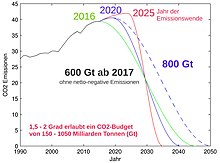Carbon free economy
The term carbon-free economy (also called post-fossil economy ) describes the vision of an economic system that is operated with complete renunciation of carbon dioxide emissions . The transition from the current carbon-based economy to a low-carbon economy to a carbon-free economy is known as decarbonization .
background

Climate scientists assume a CO 2 budget which, if exceeded , would result in unpredictable consequences in the form of a post-apocalypse , such as the state of the greenhouse earth , which would create conditions hostile to human life. The idea is assumed that at an average discharge in 2017 of about 40 Gt CO 2 equivalent per year (GtCO 2 e / a) of the human in the case of a missing change in the emissions, depending on the assumed CO 2 -Budget still about Stay 20 to 30 years until this budget is exhausted; thereafter, because of the very long-term absorption of greenhouse gases by the earth system, no greenhouse gases should be emitted for millennia. In order to keep the climate system for the human species within an appropriate framework in the long term, a rapid changeover of the economic system without greenhouse gases is necessary.
activities
Exemplary examples of measures to create a carbon-free economy are the abandonment of internal combustion engines (e.g. through alternative drive technologies such as electromobility ) and the conversion of an energy supply based on the combustion of coal, crude oil and gas to renewable energy . Even negative emissions contribute to a carbon-free economy.
In this context, a carbon-free economy is often associated with a circular economy and a post-growth society.
literature
- Christiana Figueres, et al. (2018): Emissions are still rising: ramp up the cuts. Nature 564, 27-30, doi: 10.1038 / d41586-018-07585-6 .
Individual evidence
- ↑ Vicki Duscha, Alexandra Denishchenkova, Jakob Wachsmuth (2018): Achievability of the Paris Agreement targets in the EU: demand-side reduction potentials in a carbon budget perspective. Climate Policy. doi: 10.1080 / 14693062.2018.1471385 .
- ↑ Will Steffen , Johan Rockström , Katherine Richardson , Timothy M. Lenton , Carl Folke , Diana Liverman , Colin P. Summerhayes, Anthony D. Barnosky , Sarah E. Cornell, Michel Crucifix, Jonathan F. Donges, Ingo Fetzer, Steven J. Lade, Marten Scheffer, Ricarda Winkelmann & Hans Joachim Schellnhuber (2018). Trajectories of the Earth System in the Anthropocene. In: Proceedings of the National Academy of Sciences . August 6, 2018 doi: 10.1073 / pnas.1810141115 .